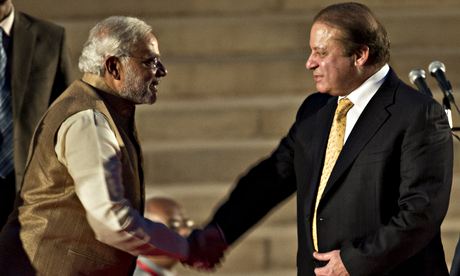May 2014 brought the promise of progress in India-Pakistan relations. After the historic swearing-in of Indian Prime Minister Narendra Modi - the
first ever attended by a Pakistani prime minister - people were cautiously optimistic about relations between the feuding nuclear powers. That optimism was extended when Modi and Pakistani Prime Minister Nawaz Sharif
publicly exchanged letters of gratitude toward each other, which followed up on the
meeting the two held after Modi's swearing-in. In his letter, Modi also expressed India's sympathy toward Pakistan after the
terror attack on Karachi's airport.
 |
| Prime Ministers Narendra Modi and Nawaz Sharif shake hands after Modi's swearing-in (source: The Guardian). |
These developments were promising, and they may well continue. Of course, it will take more than a meeting and a letter exchange to overcome decades of mistrust and border attacks. Furthermore, both prime ministers must still deal with local populations that are not so quick to mend old wounds. Moving too quickly toward improved relations will undercut the support both leaders need to rule. Indeed, Sharif was condemned for the very decision to attend Modi's inauguration.
Unfortunately, both leaders have already gone back to the tried-and-true tact of using the other country as an easy target for domestic woes. Last week, for example,
Modi declared in a speech to Indian troops that Pakistan now wages a "proxy war of terrorism" because it lacks the capabilities to wage a conventional war.
Sharif, meanwhile, finds his own prime ministership at risk in the midst of
large-scale protests. Those protests are led by political rival Imran Khan of the PTI party. Khan is calling for Sharif's ouster due to issues ranging from alleged vote-rigging in the 2013 elections to the "dynastic" nepotism of the Sharifs. Although he has
called on protesters to keep their actions peaceful, he has also called on them to stop paying taxes and bills as part of the larger protest.
Perhaps it should not come as a surprise that, in the midst of this internal challenge to Sharif's rule, Pakistani military forces
attacked Indian border posts at 20 different locations yesterday. Incidentally, none of Pakistan's major English-language outlets - Dawn, The News International, and The Express Tribune - reported on the attacks.
Ultimately, the political strategy of pandering to the local population while trying to present a more suitable international front is nothing new. Its most recent notable iteration may be Iran's positions during the recent nuclear talks. Iran may try to
woo investors and
welcome the UN nuclear watchdog, on the one hand, but
talk about destruction of the U.S. in the event of an attack, on the other. In the case of Pakistan and India, the effort to garner local support by castigating the other country is a short-term tactic. It is also one that finds itself increasingly outdated in the digital age, where information from non-local sources is more readily available. The longer-term strategy of mending old wounds is harder; it will involve less flashy developments like multiple trade summits, cooperation in counter-terrorism investigations, and regular regional meetings to address issues facing the two and their smaller neighbors. This will take time, perseverance, patience, and restraint, none of which lend themselves well to the political arena. Ultimately, the coming months will tell whether May 2014 was a new beginning or merely an aberration in the long-standing dispute.






